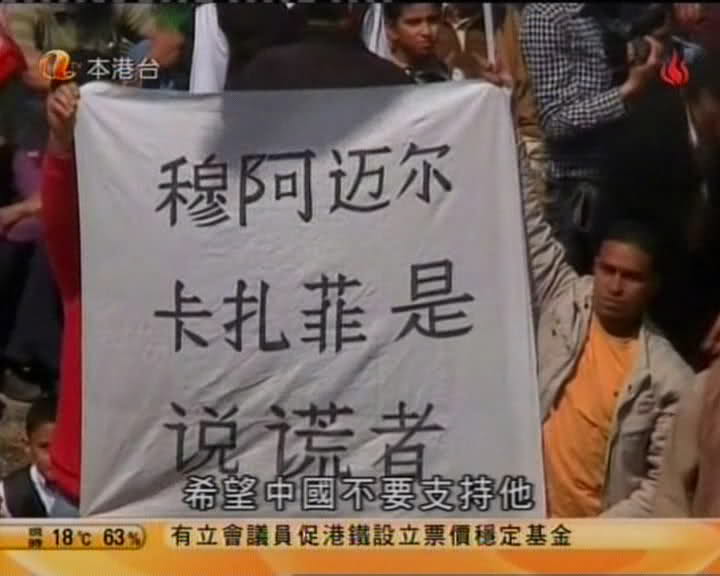Chinese sign in Benghazi
« previous post | next post »
In "Maybe Mubarak understands Chinese," I dissected a couple of Chinese signs held by protesters in Egypt. Now we encounter another interesting Chinese sign in Libya:
The characters on the sign say:
Mù'āmài'ěr 穆阿迈尔 (Muammar)
Kǎzhāfēi shì 卡扎菲 是 (Gadaffi is)
shuōhuǎng zhě 说谎者 (a liar)
There are two interesting aspects to the second line. First is the transcription of Gadaffi as Kǎzhāfēi instead of as Kǎdāfēi. It would appear that the transcriber has made an earnest effort to reflect the (historical) voiced interdental fricative represented by ḏ in the romanization al-Qaḏḏāfī of القذافي (now pronounced in Libya as al-Gaddāfī). Second is the slightly less noticeable space between 卡扎菲 and 是, which indicates an awareness of word division, something not usually reflected in chinese-character orthography.
If the sentence were all on one line, it would be proper to write it thus, 穆阿迈尔·卡扎菲是说谎者, where the small dot indicates a break between the name and surname of a foreigner.
it is not wrong to say 穆阿迈尔卡扎菲是说谎者, as is written on the sign in the photograph, but it sounds a little pedantic or stilted. For a political slogan, it would be more appropriate to write 穆阿迈尔卡扎菲是大骗子, where dà piànzi 大骗子 ("big liar") — or you could just write piànzi 骗子 ("liar") — replaces shuōhuǎng zhě 说谎者 ("a liar").
The subtitles in white at the bottom of the picture read:
Xīwàng Zhōngguó bùyào zhīchí tā 希望中國不要支持他。("We hope that China will not support him.")
(Thanks are due to Anne Henochowicz, Sijie Ren, Sophie Wei, Gianni Wan, Jing Wen, Rebecca Fu, and Mark Swofford.)

Randy Alexander said,
March 31, 2011 @ 9:12 am
I would take 骗子 to be "cheater" rather than "liar". I agree that it would be more natural to use this term, but it doesn't (at least as I understand it) have the specific meaning of "liar".
Anne Henochowicz said,
March 31, 2011 @ 9:29 am
卡扎菲 is the most common transliteration on the Internet right now. It was the #1 trending topic on Sina Weibo last week.
Richard M Buck said,
March 31, 2011 @ 9:53 am
I have heard a commenter on the radio from elsewhere in the Arab world refer to Gadaffi with something much more like a medial -z- sound, so the -zh- may represent more than just an effort at a historical pronunciation. (Ḏal is also pronounced zal in Urdu and Persian.)
[(myl) From the Wikipedia article on Varieties of Arabic:
ث thaa, ذ dhaal (CA /θ/, /ð/) become /t, d/ in much of Egypt and North Africa (including Malta), and become /s, z/ in the Levant (except for some words, in which they become /t, d/), but remain /θ/ and /ð/ in Iraqi, Yemenite, Tunisian, rural Palestinian, Eastern Libyan, and some rural Algerian dialects. In one Arabic-speaking town in Turkey, they become /f, v/.
]
J Tseng said,
March 31, 2011 @ 12:04 pm
I don't think the creator of the banner necessarily made any transcription efforts; 卡扎菲 (kǎzhāfēi) is the conventional rendering of the name in [most of] China. In other Chinese-speaking regions one can find the forms 卡達菲 (kǎdáfēi) or 格達費 (gédáfèi, which I would guess is based on English Gaddafi).
Ethan said,
April 1, 2011 @ 10:46 pm
I'm betting it's as simple as this: they heard 本港台 was around and thought it would be a good idea to prepare a banner, which they translated on a computer. (As people have already mentioned, 卡扎菲 is the current standard translation for his name.) That said, if the characters were drawn instead of printed (any input on this? I really can't tell) then it was probably made for them by a native mainland Chinese.
Bob Violence said,
April 1, 2011 @ 11:40 pm
卡達菲 is usual in Hong Kong, 格達費 in Taiwan. Muammar seems to be the same everywhere except for simplified/traditional differences (穆阿迈尔/穆阿邁爾).
Merri said,
April 12, 2011 @ 8:32 am
Notice that the usual French translitteration, Kadhafi, signals the interdental fricative too.
Wentao said,
April 28, 2011 @ 6:47 am
说谎者 is a very "westernised" expression barely ever used by a native speaker. 骗子 is far more common, however it means more like "crook", "imposter" and "cheater". By the way, the writing on the banner shows amateur but beautiful 宋体字, probably copied from the computer font or a printed source. Every single serif is clearly visible – very recommendable effort!
Tony said,
October 11, 2011 @ 3:28 pm
I'd say "说谎者" is about as stilted as "speaker of lies", to me. I agree that the demonstrators did an excellent job. It's neat and grammatically sound.